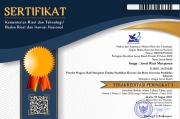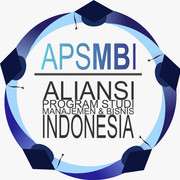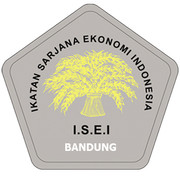The Impact of Green Human Resource Management on Employee Performance with Pro-Environment Behavior as a Mediating Variable
Abstract
The Green Human Resource Management (GHRM) practices at the Environmental Department of Surabaya City Government have been applied since several years ago. However, there is still no evidence that the application of GHRM at the Environmental Department can improve overall employee performance. This research aims to analyze the influence of GHRM on employee performance with the role of employee green behaviour as a mediation variable and transformational leadership as a moderation variable using the SEM-PLS method on a sample of 171 employees of DLH Kota Surabaya. SEM-PLS was used because of its ability to obtain relationship results between variables. The results showed that GHRM practices did not have a significant effect on employee performance, although they had a positive impact on employee green behaviour. The employee green behavior failed to mediate the relationship between GHRM and employee performance. Transformational leadership has proved effective as a moderator variable in the relationship of GHRM to employee performance. To maximize the effectiveness of GHRM, there needs to be strong leadership support as well as wider involvement of the entire employee in pro-environmental practices.
Keywords
Full Text:
PDFReferences
Ababneh, O. M. A. (2021). How do green HRM practices affect employees’ green behaviors? The role of employee engagement and personality attributes. Journal of Environmental Planning and Management, 64(7), 1204–1226. https://doi.org/10.1080/09640568.2020.1814708
Ahmad, I., Kifayat, U., & and Khan, A. (2022). The impact of green HRM on green creativity: mediating role of pro-environmental behaviors and moderating role of ethical leadership style. The International Journal of Human Resource Management, 33(19), 3789–3821. https://doi.org/10.1080/09585192.2021.1931938
Bass, B. M., & Avolio, B. J. (1994). Improving organizational effectiveness through transformational leadership. SAGE Publications.
Bimo, I. D., & and Sulistyaningsih, E. (2024). Greening the workforce: a systematic literature review of determinants in green HRM. Cogent Business & Management, 11(1), 2429793. https://doi.org/10.1080/23311975.2024.2429793
Chuah, Y. D., Mohamad, N. M., Lim, Y. M., & Tan, H. W. (2021). Impact of green human resource management practices towards green lifestyle and job performance. Turkish Journal of Computer and Mathematics Education, 12(11), 5174–5181. https://doi.org/10.17762/turcomat.v12i11.6840
Doghan, M. A. Al. (2024). Green HRM practices, green capability and green performance: the avenues towards greener economy. Cogent Business & Management, 11(1), 2418418. https://doi.org/10.1080/23311975.2024.2418418
Dumont, J., Shen, J., & Deng, X. (2017). Effects of green HRM practices on employee workplace green behavior: The role of psychological green climate and employee green values. Human Resource Management, 56(4), 613–627. https://doi.org/10.1002/hrm.21792
Fauzi, M. A., Heesup, H., Mohd Hafiz, H., & and Bakar, N. A. A. (2023). Pro-environmental behavior in tourism and hospitality: science mapping of present and future trends. Journal of Travel & Tourism Marketing, 40(8), 712–727. https://doi.org/10.1080/10548408.2023.2293009
Ghozali, I. (2016). Partial Least Squares: Konsep, teknik dan aplikasi menggunakan SmartPLS 3.0 untuk penelitian empiris. Badan Penerbit Universitas Diponegoro.
He, J., Xiaomei, C., Guiqing, L., Xiaodan, Z., & and Morrison, A. M. (2024). Volunteering and pro-environmental behavior: the relationships of meaningfulness and emotions in protected areas. Journal of Sustainable Tourism, 32(2), 304–321. https://doi.org/10.1080/09669582.2022.2141249
Hoshyar, V., Omid, B., & and Ahmadi Saeed, S. F. (2024). The Impact of Personal Values on Pro-Environmental Behavior. Journal of Quality Assurance in Hospitality & Tourism, 25(5), 1220–1246. https://doi.org/10.1080/1528008X.2022.2151548
Kim, A., Kim, Y., Han, K., Jackson, S. E., & Ployhart, R. E. (2019). Multilevel influences on voluntary workplace green behavior: Individual differences, leader behavior, and coworker advocacy. Journal of Management, 45(5), 2037–2069. https://doi.org/10.1177/0149206317734890
Kleespies, M. W., Viktoria, F., Til Jonas, T., Alina Miriam, B., Eva, G., Maximilian, C., Michael Matthias Günther, K., Laura, K., Valentin, R., Valentin, B., Volker, W., & and Dierkes, P. W. (2024). Environmental Behavior in the Private Sphere – Development and Evaluation of the Personal Pro-Environmental Behavior (PPB) Scale. Measurement: Interdisciplinary Research and Perspectives, 22(2), 160–174. https://doi.org/10.1080/15366367.2023.2246113
Li, W., Alaa Amin, A., Tamara, M., Osama, K., & and Parveen, M. (2023). Towards Examining the Link Between Green HRM Practices and Employee Green in-Role Behavior: Spiritual Leadership as a Moderator. Psychology Research and Behavior Management, 16(null), 383–396. https://doi.org/10.2147/PRBM.S396114
Li, Z.-F., Jin-Chao, W., & and Deng, S. (2022). The effect of destination social responsibility on tourists’ pro-environmental behavior. Asia Pacific Journal of Tourism Research, 27(12), 1233–1246. https://doi.org/10.1080/10941665.2023.2174038
Lianasari, M., & Ahmadi, S. (2022). Pengaruh kompetensi dan lingkungan kerja terhadap kinerja pegawai melalui motivasi sebagai variabel intervening di Dinas Pendidikan dan Kebudayaan Kota Lubuklinggau. Jurnal Ilmiah Ekonomi Global Masa Kini, 13(1), 51–59.
Liu, J., Qing, X., & and Zhou, T. (2023). Can pro-environmental behavior increase farmers’ income?—Evidence from arable land quality protection practices in China. Economic Research-Ekonomska Istraživanja, 36(1), 2179512. https://doi.org/10.1080/1331677X.2023.2179512
Liu, Y., & and Li, X. (2021). Pro-Environmental Behavior Predicted by Media Exposure, SNS Involvement, and Cognitive and Normative Factors. Environmental Communication, 15(7), 954–968. https://doi.org/10.1080/17524032.2021.1922479
Luo, J. M., Ziye, S., & and Wu, S. I. (2024). Impact of employees’ generativity on green policy attitude, environmental commitment, and green behaviour. Journal of Environmental Planning and Management, 67(14), 3645–3668. https://doi.org/10.1080/09640568.2023.2232103
Muisyo, P. K., Su, Q., Mercy Muthoni, J., Thu Hau, H., & and Ho, T. H. (2022). Green HRM and employer branding: the role of collective affective commitment to environmental management change and environmental reputation. Journal of Sustainable Tourism, 30(8), 1897–1914. https://doi.org/10.1080/09669582.2021.1988621
Nathania, A. G., & Sandroto, C. W. (2022). The effect of green human resource management on performance with green lifestyle moderation and perceived organizational support. Jurnal Manajemen Bisnis, 13(1), 11–18.
Nisar, Q. A., Shahbaz, H., Faizan, A., Sonaina Saif, G., & and Waqas, A. (2024). The Role of Green HRM on Environmental Performance of Hotels: Mediating Effect of Green Self-Efficacy & Employee Green Behaviors. Journal of Quality Assurance in Hospitality & Tourism, 25(1), 85–118. https://doi.org/10.1080/1528008X.2022.2109235
Paresti, A. (2021). Pengaruh green human resource management terhadap pro-environmental behavior dan kinerja karyawan dengan mediasi motivasi kerja pada PT. X. [Skripsi, Universitas Negeri Jakarta]. https://repository.unj.ac.id/
Perano, M., Rabail, A., Nisar Ahmed, C., & and Casali, G. L. (2025). The nexus between green HRM and environmental performance for sustainable business excellence: the role of employees’ environmental passion and pro-environmental behavior. Total Quality Management & Business Excellence, 36(1–2), 1–25. https://doi.org/10.1080/14783363.2024.2430258
Ragas, M. W., Culp, R., & Hall, M. (2017). Green lifestyle moderates GHRM’s impact on job performance. International Journal of Human Resource Studies, 7(3), 1–12. https://doi.org/10.5296/ijhrs.v7i3.11437
Renwick, D. W. S., Redman, T., & Maguire, S. (2013). Green human resource management: A review and research agenda. International Journal of Management Reviews, 15(1), 1–14. https://doi.org/10.1111/j.1468-2370.2011.00328.x
Riwati, S., Widiyanti, M., & Rini, D. S. (2021). The influence of transformational leadership and work motivation on employee performance mediated by organizational commitment. International Journal of Multicultural and Multireligious Understanding, 8(5), 470–478.
Sabokro, M., Kordnaeij, A., & Amiri, A. N. (2021). The effect of green human resource management on employees' green behavior with the mediating role of green motivation. Journal of Environmental Management and Tourism, 12(6), 1567–1576.
Sitorus, T. T., & Suhartini, E. (2022). Pengaruh gaya kepemimpinan dan profesionalisme melalui motivasi kerja terhadap kinerja guru di Sekolah Menengah Atas Negeri 1 Merangin. Jurnal Ilmiah Manajemen dan Bisnis, 23(2), 105–116.
Su, W., Boloroo, B., & and Hahn, J. (2024). Does green human resources management (GHRM) promote employee environmental performance? A multilevel time-lagged study from Mongolia. Journal of Environmental Planning and Management, 67(10), 2135–2156. https://doi.org/10.1080/09640568.2023.2198666
Tang, G., Chen, Y., Jiang, Y., Paille, P., & Jia, J. (2018). Green human resource management practices: Scale development and validity. Asia Pacific Journal of Human Resources, 56(1), 31–55. https://doi.org/10.1111/1744-7941.12147
Tanveer, M. I., Mohd Yusoff, Y., Olawole, F., & and Ngah, A. H. (2024). Examining the strategic and operation HR competencies as enablers of green human resource management practices: mediating role of perceived environmental orientation. The International Journal of Human Resource Management, 35(19), 3305–3339. https://doi.org/10.1080/09585192.2024.2403542
Wulansari, L. (2018). Pengaruh kepemimpinan transformasional terhadap perilaku kerja dan kinerja karyawan. Jurnal Ilmu Manajemen, 6(3), 255–262.
Yousaf, H. Q., Sidra, M., Muneeb, A., & and Rehman, S. (2025). Environmental culture, green human resource management, green innovation, and environmental performance: the moderating role of corporate social responsibility. Journal of Environmental Planning and Management, 68(8), 1858–1880. https://doi.org/10.1080/09640568.2023.2298263
Zibarras, L. D., & and Coan, P. (2015). HRM practices used to promote pro-environmental behavior: a UK survey. The International Journal of Human Resource Management, 26(16), 2121–2142. https://doi.org/10.1080/09585192.2014.972429
DOI: https://doi.org/10.17509/image.2025.007
Refbacks
- There are currently no refbacks.
Copyright (c) 2025 Andhini Kusumawardani, Andre Dwijanto Witjaksono, Anang Kistyanto

This work is licensed under a Creative Commons Attribution-ShareAlike 4.0 International License.
Image : Jurnal Riset Manajemen is licensed under a Creative Commons Attribution-ShareAlike 4.0 International License
View My Stats



